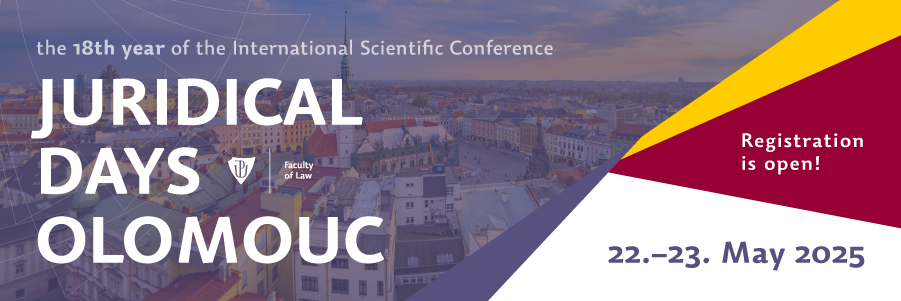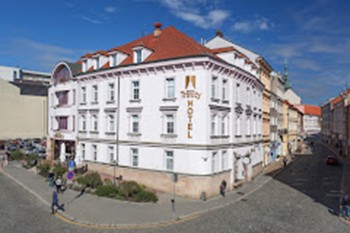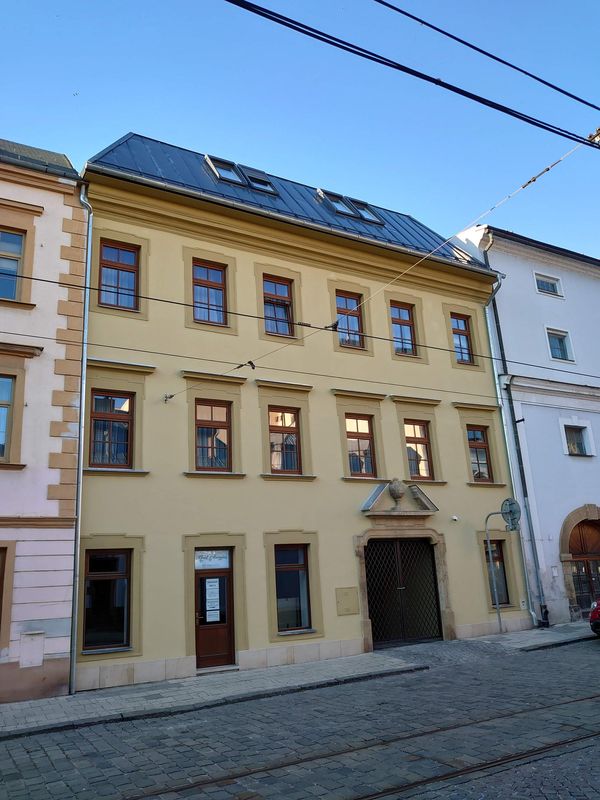
The International Scientific Conference Juridical Days in Olomouc is the most important event that takes place every year in the field of scientific life at the Olomouc Faculty of Law.
The conference will take place this year from 22nd to 23rd May 2025 and in line with its tradition it will take place in two parts. Prominent experts will speak in the introductory plenary section, the second part will take place through thematically focused sections. We believe that this year, which will already be the 18th year of the Juridical Days in Olomouc will be at least as successful as in the previous years and it will once again bring a lively and fruitful scientific debate.
Preliminary programme of the conference
The final programme is subject to change over time and will be created and published after registration closes around mid-May.
Thursday 22 May 2025
| 09:00–10:00 | Arrival and registration of participants |
| 10:00–12:00 | Plenary section |
| 12:00–13:00 | Lunch |
| 13:00–15:30 | 1st block of debates in sections |
| 15:30–16:00 | Coffee break |
| 16:00–18:30 | 2nd block of debates in sections |
| 18:30 | Gala Banquet |
| 21:00 | Closing of the building |
Friday 23 May 2025
| 08:30–09:00 | Registration of participants |
| 09:00–10:30 | 3rd block of debates in sections |
| 10:30–11:00 | Coffee break |
| 11:00–13:00 | 4th block of debates in sections |
| 13:00–14:00 | Lunch, closing of the conference |
Sections and annotations
1. Rule of Law in the Context of European Union Law and Politics
Guarantor: Assoc. Prof. et Assoc. Prof. JUDr. Naděžda Šišková, Ph.D.; Mgr. et Mgr. Ondřej Filipec, Ph.D.
Annotation: Rule of Law as a backbone of every democracy, has in the context of the EU Law and Politics its own special significance and added value. Especially it creates the basis for the entire legal system of the EU, ensuring the mutual trust among Member States in the functioning of their democratic institutions, which is vital for the deepening of European integration.
The section will focus on the analysis of the integral parts of the EU concept of the rule of law, such as for instance the independence of justice, respect for human rights, support of civil society, independence of media, free and fair elections etc. Also the legal instruments for the protection of rule of law will be discussed. The section will also deal with the fight against negative influences, such as disinformers, interference into the democratic institutions and into the privacy of individuals.
The special attention will be dedicated to the application of the rule of law principles in the field of external relations of the Union and the associated issues.
Organised in cooperation with the Czech Association for European Studies.
2. Public Finance in the Context of Legislative Changes
Guarantor: JUDr. Zdenka Papoušková, Ph.D.; JUDr. et Mgr. Taťána Zelenská, Ph.D.
Annotation: The Czech Republic is experiencing a busy period of legislative changes affecting all sub-areas of financial law. How does public finance affect those changes that have already been implemented? What can we think about the other planned changes? Legal and economical aspects of these and related issues will be presented and discussed in the financial law section of the conference.
3. Current Issues of Administrative Punishment
Guarantor: Prof. JUDr. Vladimír Sládeček, DrSc.; JUDr. Monika Horáková, Ph.D.; JUDr. Soňa Pospíšilová, Ph.D.
Annotation: Administrative punishment is still a current and lively matter for the study of administrative science and the science of administrative law. The aim of this section is to evaluate the benefits of the current legislation, which has changed significantly since the reform of administrative punishment in 2017, including the influence of administrative practice and case law, which draws attention to problematic aspects of the legislation. The section also aims to stimulate and open a discussion on various institutes of substantive and procedural law, in relation to international and European sources related to the issue of administrative punishment. The section is open to contributions dealing with current issues of administrative punishment, both in the light of amendments to the relevant regulations in the various sections of public administration and in the light of the evolving relevant case law. We also welcome contributions responding to developments in society and science, the use of AI in administrative law and the automatisation of decision-making processes.
4. Primary and Secondary Educational System – Current Issues of Public Administration and Education
Guarantor: JUDr. Lucia Madleňáková, Ph.D.; JUDr. Petra Melotíková, Ph.D.
Annotation: In this session, we will focus on several areas related to the current functioning of primary and secondary education. We are guided by the desire to focus not only on the aspects related to the performance of state and local government in this area, but also to develop a discussion on the topic of education itself and the competences that we require from pupils and students and to which they should be led by teaching staff. This offers questions related to the school register, the school legal entity, teaching staff, but also the coherence of the whole education system, the functionality of entrance examinations, etc.
5. Es muß sein! or Inheritance Law as an Inevitable Part of Law
Guarantor: doc. JUDr. et Mgr. Ondřej Horák, Ph.D.; JUDr. Adam Talanda, Ph.D.
Annotation: Inheritance law is as inevitable for every person as it is for every legal system. Almost every person will become a testator, and most people will also be heirs. Therefore, legal systems, from Roman law through the ABGB to the present day, have included the regulation of inheritance law as a continuation of ownership. Contemporary Czech inheritance law, in an effort to return to Central European legal tradition, has been significantly inspired by past or foreign regulations. A comparison with historical or other regulations of inheritance law can thus serve not only to better understand the current legal regulation but also to indicate its future direction. This historical-inheritance law section is therefore open to any geographical or historical comparison that contributes to the discussion of inheritance law.
6. Intellectual Property Law
Guarantor: prof. JUDr. Ivo Telec, CSc.
Annotation: The section focuses on free topics in industrial and other intellectual property or unfair competition and similar areas in terms of legislation, case law or legal doctrines.
7. Labour Law Between Rigidity and Flexibility: Trends and Challenges of the 21st Century
Guarantor: JUDr. Petr Podrazil, Ph.D.
Annotation: In a dynamically changing world of work, the question of balancing rigidity and flexibility in labour relations is gaining increasing importance. On the one hand, labour law serves a protective function, aiming to ensure stability, security, and decent working conditions. On the other hand, there is growing pressure for liberalisation and adaptability in labour relations, which are crucial for employers' competitiveness, innovation, and the ability to respond to economic fluctuations and technological changes.
This section will focus on current trends and challenges that labour law faces in the context of a changing labour market. Topics of discussion will include flexible forms of employment, contractual freedom versus employee protection, the impact of digitalisation and automation on traditional models of labour relations, and the role of labour law during economic crises. The section will also examine whether and how reforms in labour regulation should be implemented and the direction of modern legislative trends in Europe and globally.
The goal of this section is to provide a platform for expert discussions among academics, practising lawyers, employer representatives, trade unions, and other relevant stakeholders in labour relations.
8. The role of insolvency law in the legal regulation of relations between creditors and debtors
Guarantor: Mgr. Michaela Sigmundová, Ph.D.
Annotation: Insolvency law has been constantly evolving for almost two decades, with amendments to the Insolvency Act often responding to social changes. Finding a balance between what is fair for creditors and debtors is often very difficult. Bankruptcy resolution tools are becoming a political issue in the public debate. What direction should insolvency law take in our country, what other instruments or changes to the resolution of bankruptcy of natural and legal persons could be the subject of legislation, to what extent the success of insolvency processes depends on the cooperation of the court, creditors and debtors, where gaps in insolvency law or inspiration can be found in other jurisdictions, how to improve the financial literacy of citizens, whether it is time to change the subject matter jurisdiction of the courts in this area, to what extent the currently set examinations of insolvency practitioners are satisfactory, or whether insolvency law requires further systemic changes, all of this can be discussed together in this section.
9. Remedies in Civil Court Proceedings
Guarantor: JUDr. Klára Hamuľáková, Ph.D.
Annotation: The section will focus on conceptual issues of legal regulation of legal remedies in civil proceedings and on individual problematic aspects of their application. It will discuss the role of remedies in a fair trial, their effectiveness and accessibility. Particular attention will be paid to current challenges and possibilities of further development of the legal regulation.
10. The Right to Personal Liberty of People with Disabilities: Current human rights challenges from an interdisciplinary perspective
Guarantor: JUDr. Maroš Matiaško, LL.M., Ph.D.
Annotation: The panel addresses the right to personal liberty of people with disabilities from a multidisciplinary perspective. The ambition is to create a space for sharing perspectives on the constitutional dimension of interference with personal liberty in the context of psychiatric care. Lawyers, social scientists, medical and health professionals, as well as self-advocates and professionals with direct experience, will have the opportunity to discuss the specific tension between the need for security on the one hand and the imperative of personal freedom on the other. The contributions and discussions will provide a deeper understanding of the constitutional limits to the legality of interference with the personal liberty of people with disabilities and allow for critical reflection on existing case law, legal framework and practice.
Special event (Friday 23 May)
"A citizen between the on-line and off-line world: the constitutional right of the individual to choose the form of communication"
A scholarly debate on the questions of whether an individual can realize her/his life off-line or whether the state can force her/him to act only in digital way, whether such a consequence would be consistent with the constitutional principles of a democratic state, and whether it is therefore not appropriate to guarantee the right of access to public services even without digital technologies on the constitutional level. The debate will also include the question of the appropriateness of establishing a constitutional right to pay in cash.
Speakers:
- Doc. JUDr. Michael Kohajda, Ph.D.
- Prof. JUDr. PhDr. Tomáš Gábriš, PhD., LL.M., MA
- Doc. JUDr. Zdeněk Koudelka, Ph.D.
- Mgr. Jan Kutan
- JUDr. Sandra Konečná
(Participation in this event will be free for all conference participants.)
11. On Current Amendments to Substantive Criminal Law
Guarantor: doc. JUDr. Filip Ščerba, Ph.D.
Annotation: In recent years, the Czech Criminal Code has been quite significantly amended, and further relatively extensive amendments are being prepared. In Slovakia, too, there was a significant amendment to the criminal law, which attracted considerable attention from the public as well. As part of the criminal law section of the Olomouc Law Days, attention will therefore be focused on this new, or prepared legislation, or phenomena to which the amendments are trying to respond (deepfake technology, the spread of disinformation and similar anti-state activities, etc.), space will also be devoted to a critical evaluation of the current criminal policy. On the first day of the conference, invited speakers will present their contributions, and then a wide space will be provided for discussion by all participants. On the second conference day, all other conference participants will have the opportunity to make their contributions.
12. The protection of the weaker party
Guarantor: doc. JUDr. Blanka Vítová, Ph.D., LL.M.
Annotation: The section focuses on the legal aspects of the protection of the weaker party in different areas of law. The aim is to analyse and discuss the tools, principles and challenges involved in protecting the weaker party, whether in consumer, labour, civil, commercial, family or other areas of law. The session will also provide a forum for the discussion of the procedural aspects of the protection of the weaker party, including access to justice, procedural safeguards and the legal means to enforce the protection. New legislative trends, case law developments and practical experience in applying the legislation will also be addressed.
Experts from academia and practice, legal theoreticians and practitioners are invited to participate. The section welcomes interdisciplinary approaches and contributions that reflect both the theoretical background and the practical implications of the legal regulation of the protection of the weaker party in different contexts.
Contributions may be presented in Czech or English.
Information for participants
Please send the electronic application no later than on Monday 5th May 2025..
The organizers of the conference reserve the right to select from the submitted proposals those that will be presented actively.
The price of the conference fee includes refreshments during the conference.
All participants must pay a fee. Your space is not secured until your registration is paid in full.
Participation fee
Participation fee: CZK 2500/EUR 100
(Includes professional programme and refreshments during the conference).
The fee must be paid by a bank transfer to one of the following accounts (one for payments in CZK, one for payments in EUR). We do not accept cash payments.
Do not forget to assign a variable symbol to the payment. When filling out the payment order, include the name and surname of the participant in the message to the beneficiary box. This is the only way we are able to pair the payment correctly. Payment must be made by 5 May 2025.
The variable symbol will be automatically generated and displayed to the conference participants after registration and will also be sent to their email.
Once paid, the fee is non-refundable. We do not accept cash payments.
ACCOUNT IN CZECH CROWNS
account number: 19-1096330227/0100 – KB,
variable symbol: The variable symbol for conference participants is automatically generated and displayed after registration, at the same time they will receive it via e-mail.
EURO ACCOUNT
account number: 43-3855090287/0100 – KB, a.s.
IBAN: CZ9801000000433855090287
SWIFT CODE: KOMBCZPPxxx
variable symbol: The variable symbol for conference participants is automatically generated and displayed after registration, at the same time they will receive it via e-mail.
Faculty billing information:
Faculty of Law UP Olomouc
17. listopadu 8, 779 00 Olomouc
Company registration number: 61989592
Tax identification number: CZ61989592
If you would like to be invoiced by the sending organization, please also include the sending organization's ID number and tax ID number in the registration form. Invoices are issued by our accountant Marcela Mazuráková: marcela.mazurakova@upol.cz.
Confirmation of participation in the conference will be sent by e-mail after the conference, please request the Confirmation via email to marketa.sykorova@upol.cz.
Venue
Faculty of Law, Palacký University in Olomouc
17. listopadu 8
779 00 Olomouc
Contacts
doc. JUDr. Michael Kohajda, Ph.D.
Vice-Dean for Doctoral Studies, Qualification Proceedings and Finance
Vice-Dean for Communications, External Relations and Conference Support
michael.kohajda@upol.cz, +420 585 637 613
Mgr. Markéta Sýkorová
marketa.sykorova@upol.cz, +420 585 637 683













